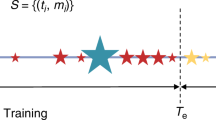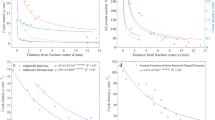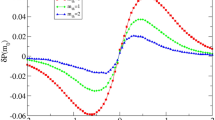Abstract
THIS communication outlines a probability model which seems to provide an adequate basis for making predictions concerning the occurrence of largest earthquake magnitudes over time: (a) The number of earthquakes in a year is a Poisson random variable with mean α; (b) X, the earthquake magnitude, is a random variable distributed with cumulative distribution function: 
This is a preview of subscription content, access via your institution
Access options
Subscribe to this journal
Receive 51 print issues and online access
$199.00 per year
only $3.90 per issue
Buy this article
- Purchase on Springer Link
- Instant access to full article PDF
Prices may be subject to local taxes which are calculated during checkout
Similar content being viewed by others
References
Gumbel, E. J., Statistics of Extremes (Columbia University Press, New York, 1958).
Richter, C. F., Elementary Seismology, 359 (W. H. Freeman, San Francisco, 1958).
Lomnitz, C., Bull. Seis. Soc. Amer., 54, 1271 (1964).
Iscol, R., G2 BC REGRESS (University of California, Computer Center, Berkeley, August 1964).
Gutenberg, B., and Richter, C. F., Seismicity of the Earth and Associated Phenomena, 18 (Princeton Univ. Press, 1949).
Author information
Authors and Affiliations
Rights and permissions
About this article
Cite this article
EPSTEIN, B., LOMNITZ, C. A Model for the Occurrence of Large Earthquakes. Nature 211, 954–956 (1966). https://doi.org/10.1038/211954b0
Issue Date:
DOI: https://doi.org/10.1038/211954b0
This article is cited by
-
Probabilistic assessment of earthquake hazard in the Andaman–Nicobar–Sumatra region
Natural Hazards (2021)
-
Probabilistic assessment of tropical cyclones’ extreme wind speed in the Bay of Bengal: implications for future cyclonic hazard
Natural Hazards (2020)
-
Bayesian Estimation of the Maximum Magnitude mmax Based on the Extreme Value Distribution for Probabilistic Seismic Hazard Analyses
Pure and Applied Geophysics (2020)
-
Forecasting the magnitude of the largest expected earthquake
Nature Communications (2019)
-
Evidence of Systematic Triggering at Teleseismic Distances Following Large Earthquakes
Scientific Reports (2018)
Comments
By submitting a comment you agree to abide by our Terms and Community Guidelines. If you find something abusive or that does not comply with our terms or guidelines please flag it as inappropriate.



